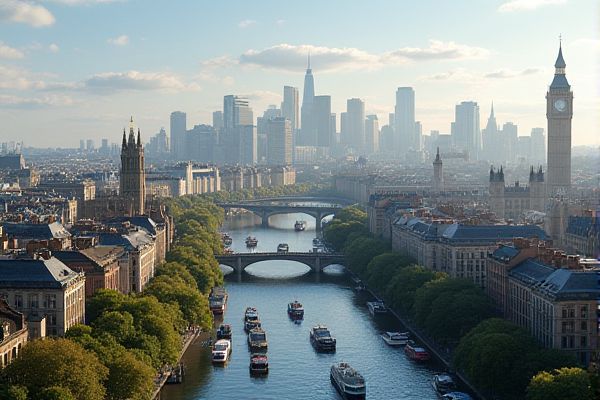
What to know as new resident in United Kingdom: National Health Service (NHS). UK banking system. Council tax requirements. Public transport options. Local cultural norms. Emergency contact numbers. School enrollment process. Weather and climate. Mobile phone plans. Renter's rights and obligations.
National Health Service (NHS)
As a new resident in the UK, you need to be 'ordinarily resident' to access free NHS healthcare, meaning you must be living in the UK on a lawful and properly settled basis. Primary care services like GP and nurse consultations are free, but secondary care requires meeting specific residency and immigration criteria. For more detailed information, you can refer to the NHS Entitlements Migrant Health Guide provided by the UK government.
UK banking system
To open a bank account in the UK as a new resident, you need to provide proof of identity (such as a passport or driving license) and proof of address (like a utility bill or rental agreement). Major banks like Barclays, Lloyds, and HSBC offer various account types, including online and digital banking options that can be more flexible for newcomers. For a comprehensive guide, you can visit Wise to learn more about setting up your financial life in the UK.
Council tax requirements
To pay Council Tax as a new resident, you must contact your local council to register and receive a Council Tax bill, which will specify the amount and payment schedule based on the valuation band of your property. For more detailed guidance on beginning this process, visit the Start Paying Council Tax page. By following the outlined steps, you can ensure you are correctly registered and understand your financial obligations.
Public transport options
As a new resident in the UK, you should know that public transport includes trains, long-distance coaches, airplanes, buses, metro systems like the London Underground, trams, and taxis, with varying quality and cost depending on the region. Many services can be accessed using public transport apps and contactless payment methods. For more detailed information, you can visit the UK Public Transport guide, which provides comprehensive insights into navigating the transportation network efficiently.
Local cultural norms
As a new resident in the UK, it is crucial to respect local cultural norms such as queuing, maintaining politeness and privacy, apologizing even unnecessarily, dressing appropriately, being punctual, and observing good table manners to integrate smoothly and avoid offending locals. Additionally, understanding the value of respect, tolerance, and fairness in everyday interactions and community life is essential for a positive experience. For more guidance on adapting to cultural expectations, visit Respecting Cultural Norms which provides valuable insights on how to navigate social interactions as a new expat.
Emergency contact numbers
As a new resident in the UK, it is crucial to know the key emergency numbers: 999 for life-threatening situations involving police, fire, ambulance, and coastguard services; 112 as an alternative emergency number; 101 for non-emergency police assistance; and 111 for non-emergency medical advice. There are also specific numbers for utility and regional emergencies. For a comprehensive understanding of these important contact numbers, refer to the Guide to Emergency Numbers in the UK. Additionally, be prepared to provide details and follow instructions when making an emergency call.
School enrollment process
To enroll your child in a UK school, you must apply through your local council, listing your preferred schools in order of preference, and provide necessary documents such as proof of address and visa details. Applications for primary and secondary schools have specific deadlines, and in-year applications can be made directly to the school or local council depending on the school type. For detailed information on the application process, visit the official UK Government Schools Admissions page.
Weather and climate
The UK experiences a temperate climate characterized by four distinct seasons. Summer, from June to August, sees temperatures ranging from 15 to 25°C (59°F - 77°F), while spring, from March to May, and autumn, from September to November, have milder temperatures between 5 to 15°C (41°F - 59°F). Winter, spanning November to March, often brings colder temperatures, typically between 0 to 7°C (32°F - 45°F). The weather is generally unpredictable, with significant rainfall throughout the year and notable geographic variations, particularly with colder and snowier conditions in the north and Scotland. For more detailed information on the UK's climate and geographical variations, you can visit the International Student website.
Mobile phone plans
As a new resident in the UK, you have the option to select between prepaid SIM cards and mobile contracts. Contracts usually provide cheaper rates for calls, texts, and internet use, along with the possibility to add extra services such as TV and home internet. To sign up, you'll require proof of identity, proof of UK address, and a UK bank account for payment. For more detailed information, visit the Expatica website.
Renter’s rights and obligations
As a new resident in the UK, you have the right to live in a safe and well-maintained property, challenge unfair rent increases, and be protected from unfair eviction. Your obligations include paying rent on time, taking good care of the property, reporting any problems promptly, and allowing your landlord reasonable access for inspections and repairs. For detailed information, you can visit the Private Renting section on the GOV.UK website to better understand your rights and responsibilities as a tenant.
